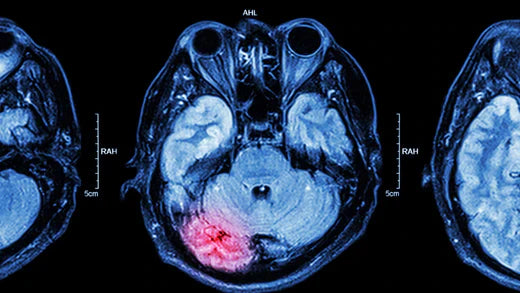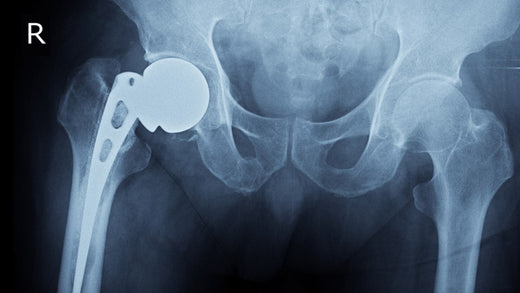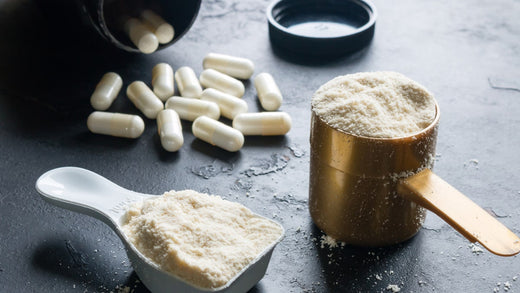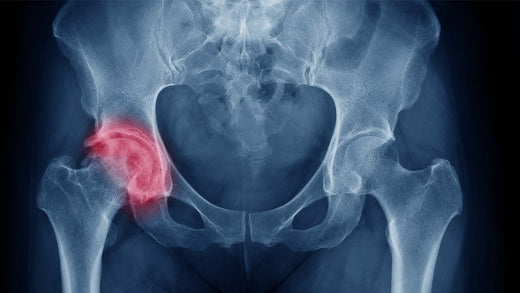
Amino Acids and Muscle Loss with Aging
Summary
Age-related muscle loss, or sarcopenia, is a natural part of the aging process, but one that can also be attenuated with targeted nutritional intervention. Researchers examined available scientific evidence to determine the role nutritional intake and anabolic stimuli have on protein metabolism in the elderly.
Conclusion
Researchers determined that supplementation with essential amino acids, especially with added leucine, can help restore and maintain muscle mass in older adults, and that when developing nutritional strategies to counteract muscle loss, inefficient sources of energy, such as the nonessential amino acids and carbohydrate, should be eliminated.

A Novel Amino Acid Composition Ameliorates Short-Term Muscle Disuse Atrophy in Healthy Young Men
Summary
Essential amino acids (EAAs) increase muscle protein synthesis and protect against muscle atrophy and weakness in times of illness or bed rest. Researchers examined the effects of EAAs on muscle loss during limb immobilization when combined with the nonessential amino acids (NEAAs) arginine, glutamine, and n-acetylcysteine (NAC).
Conclusion
Twenty-eight days of supplementation with essential amino acids and specific nonessential amino acids 3 times a day was safe and well-tolerated in young healthy men undergoing unilateral knee immobilization. EAAs plus arginine, glutamine, and n-acetylcysteine protected against muscle atrophy and fat accumulation during short-term muscle disuse.
Frontiers in Nutrition

The deleterious effects of bed rest on human skeletal muscle fibers are exacerbated by hypercortisolemia and ameliorated by dietary supplementation
Summary
The purpose of this study was to investigate the adverse effects of 28 days of bed rest plus high cortisol levels on muscle fiber function and force, as well as the potential for an essential amino acid and carbohydrate supplement to protect against muscle atrophy and functional loss of individual slow- and fast-twitch fibers of ankle (soleus) and knee (VL) extensors.
Conclusion
An essential amino acid plus carbohydrate supplement can help preserve single fiber function during long-term bed rest likely due to the ability to increase muscle protein synthesis. Researchers conclude that supplementation with essential amino acids can help stimulate muscle protein synthesis and thus protect against loss of myofibrillar protein, muscle atrophy, and decrease in fiber force and power.

Randomized double-blind trial of oral essential amino acids for dialysis-associated hypoalbuminemia
Summary
Hypoalbuminemia occurs when there is insufficient albumin in the blood. A diagnosis of hypoalbuminemia reflects significant inflammation and signals a great increase in the risk of disease and mortality in dialysis patients. In this randomized, double-blind trial researchers explored the effects of an essential amino acid supplement on serum albumin levels in hypoalbuminemic dialysis patients.
Conclusion
Results showed that an oral essential amino acid supplement can significantly improve the level of albumin in the blood in hemodialysis but not peritoneal dialysis subjects.

High anabolic potential of essential amino acid mixtures in advanced nonsmall cell lung cancer
Summary
The aim of the study was to investigate the use of essential amino acids (EAAs) as a method for preventing and improving the muscle loss that accompanies nonsmall cell lung cancer and to see if the beneficial effects are independent of muscle loss, weight loss, chronic inflammation, or survival rate. Researchers compared the anabolic properties of an essential amino acid supplement to those of a supplement made up of essential and nonessential amino acids in the profile of whey protein.
Conclusion
Researchers concluded that 14 grams of free EAAs can stimulate muscle protein synthesis to a greater degree than a supplement mimicking the amino acid profile of whey protein, and that this effect is independent of nutritional status, systemic inflammation, or disease progression, which indicates that EAAs may provide targeted nutritional support to help protect against muscle loss and improve the outcome of patients with advanced cancer.

Essential amino acid supplementation in patients following total knee arthroplasty
Summary
Researchers set out to determine if 21 days of EAA supplementation (20 grams twice a day) would lessen the muscle atrophy and mobility impairments that accompany total knee arthroplasty (TKA) in older adults.
Conclusion
Twice-daily ingestion of 20 grams of EAAs taken for 1 week before and for 2 weeks after TKA limited quadriceps and hamstring atrophy in both the operated and unoperated legs by 2- to 4.6-fold at 6 weeks after TKA. EAA use also accelerated the recovery of functional mobility, leading researchers to conclude that EAA supplementation can help mitigate muscle loss in older TKA patients.

Leucine-enriched essential amino acid and carbohydrate ingestion following resistance exercise enhances mTOR signaling and protein synthesis in human muscle
Summary
Numerous studies have shown that when essential amino acids or essential amino acids plus carbohydrate are ingested after exercise, muscle protein synthesis is increased beyond the effects of exercise alone. The aim of this study was to investigate the mechanisms behind elevated muscle protein synthesis when an essential amino acid supplement enriched with leucine and carbohydrate was taken after engaging in resistance exercise.
Conclusion
Taking a leucine-enriched essential amino acid + carbohydrate supplement 1 hour after resistance exercise can increase the mTOR signaling pathway and muscle protein synthesis by as much as 145% compared to an increase of just 41% when resistance exercise is performed without such nutritional support.

Essential amino acid supplementation in patients with severe COPD: a step towards home rehabilitation
Summary
The aim of this study was to determine the effect of essential amino acids on improved physical performance and health status in patients with COPD.
Conclusion
Oral supplementation with essential amino acids improved physical performance, nutritional and cognitive status, muscle strength, and quality of life in severe COPD patients who did not have access to a rehabilitation program.

Therapy with essential amino acids and their nitrogen-free analogues in severe renal failure
Summary
The aim of this study was to investigate the effects of nutritional intervention with essential amino acids and their nitrogen-free keto and hydroxy acid precursors on negative nitrogen metabolism of patients with chronic renal insufficiency.
Conclusion
Chronic renal failure patients on a low-protein diet who supplemented with essential amino acids or their keto acid analogues demonstrated improved protein and amino acid metabolism while patients with renal failure on a low-protein diet alone did not.

Mitigation of Muscle Loss in Stressed Physiology: Military Relevance
Summary
Researchers examined previous studies to determine potential treatments for muscle loss during critical care and illness that can also help protect against muscle loss due to external stressors during military operations.
Conclusion
The analysis showed that restoring hormonal balance, particularly testosterone status, can help the muscles be more receptive to the muscle-building effects of nutrition/dietary protein. Results also revealed that supplementation with essential amino acids can help protect against muscle loss, thereby benefiting the performance of military personnel in times of stress.

Dietary proteins and amino acids in the control of the muscle mass during immobilization and aging: role of the MPS response
Summary
This comprehensive review examines the role of essential amino acids (EAAs) in increasing muscle protein synthesis during conditions that contribute to muscle loss, and discusses the most effective nutritional strategies for maximizing the anabolic capabilities of EAAs.
Conclusion
A review of the literature suggests that supplementing with an optimal amount of amino acids between meals can help preserve lean muscle mass in aging adults.

Diet enrichment with a specific essential free amino acid mixture improves healing of undressed wounds in aged rats
Summary
Based on previous studies, researchers suspected that oral supplementation with essential amino acids would speed wound healing without the use of topical medication. The investigators compared wound closure dynamics and relevant signaling molecules in elderly rats supplemented with essential amino acids and control rats fed a standard laboratory diet.
Conclusion
Researchers concluded that nutritional intervention with essential amino acids can help accelerate wound repair by reducing inflammation and increasing collagen synthesis, and recommend future research into the therapeutic benefits of essential amino acids on chronic wounds.

Unaffected arm muscle hypercatabolism in dysphagic subacute stroke patients: the effects of essential amino acid supplementation
Summary
To determine if hypercatabolism (the excessive breakdown of muscle protein) occurs in the unaffected arm muscles of stroke patients and if supplementing with essential amino acids (EAAs) could offset this muscle loss.
Conclusion
Researchers concluded that excessive muscle loss in the unaffected arm of stroke patients can occur one month after stroke and be corrected by 8 grams of supplemented EAAs daily.

Effects of oral amino acid supplementation on long-term-care-acquired infections in elderly patients
Summary
In response to the extremely high infection rate in elderly patients at their geriatric institute, Italian researchers examined the potential of essential amino acids to lower the incidence of infection.
Conclusion
Researchers concluded that taking 8 grams of essential amino acids orally a day reduced the rate of infection in hospitalized elderly patients by 30%. Findings also suggest that high inflammation and anemia may be risk factors for infection.

Supplementation of Essential Amino Acids May Reduce the Occurrence of Infections in Rehabilitation Patients With Brain Injury
Summary
The purpose of this study was to see if oral supplementation with 8 grams of EAAs daily could reduce the rate of infections in brain injury patients during the rehabilitation period. Researchers also sought to determine the major risk factors for developing infection.
Conclusion
Findings suggest that supplementing with essential amino acids during rehabilitation from brain injury can help reduce the occurrence of infections. Prealbumin and CRP stand out as the most dependable predictors of future infections.

Resistance training and timed essential amino acids protect against the loss of muscle mass and strength during 28 days of bed rest and energy deficit
Summary
The aim of this study was to determine the synergistic effects of resistance training and essential amino acid supplementation on the body composition, muscle strength, and insulin levels of healthy male subjects after 28 days of bed rest and 14 days of active recovery.
Conclusion
After 28 days of stringent bed rest and 14 days of active recovery while eating a reduced-calorie diet, resistance exercise coupled with essential amino acid supplementation proved to have a greater protective effect on muscle mass and strength than an amino acid supplement taken alone.

Intake of low-dose leucine-rich essential amino acids stimulates muscle anabolism equivalently to bolus whey protein in older women at rest and after exercise
Summary
The majority of studies on muscle protein maintenance in the aging population have been conducted on men. This study examined the individual and combined effects of nutritional intake and exercise on muscle protein metabolism in older women. Researchers pitted the effects of a low-dose, low-calorie, leucine-dominant essential amino acid supplement against the effects of a higher calorie bolus whey protein supplement.
Conclusion
Results showed that both the leucine-enriched essential amino acid supplement and the whey protein significantly stimulated both muscle protein synthesis and albumin protein synthesis within 2 hours of intake and that engaging in resistance exercise lengthened the muscle-building window to 4 hours after intake. Whey protein demonstrated no additional growth effects over the essential amino acid supplement beyond 4 hours.

Metabolic Effects of Orally Administered Amino Acid Mixture in Elderly Subjects with Poorly Controlled Type 2 Diabetes Mellitus
Summary
The aim of the present study was to determine if oral supplementation with an amino acid mixture (OAAM) made up of essential amino acids could enhance blood sugar control and insulin sensitivity in elderly individuals with poorly regulated type 2 diabetes.Conclusion
Supplementing with an essential amino acid mixture improved glucose metabolism and insulin sensitivity in older type 2 diabetes patients, suggesting that essential amino acids may prove a beneficial nutritional strategy for the management of diabetes.
Essential Amino Acid Supplement Lowers Intrahepatic Lipid Despite Excess Alcohol Consumption
Summary
An estimated 15 million people in the United States alone have alcohol use disorder (AUD), which increases the risk of fatty liver disease and cirrhosis, marked by excess lipids in the liver. The aim of this study was to see if 8 grams and 13 grams of essential amino acids taken twice a day for 4 weeks would lower intrahepatic lipids in people with mild to moderate AUD.
Conclusion
Findings revealed that 13 grams of essential amino acids taken twice a day significantly decreased IHL with no other changes to diet, alcohol intake, or lifestyle behaviors. The low-dose of 8 grams of essential amino acids did not appear to significantly impact IHL levels.

Whey protein and essential amino acids promote the reduction of adipose tissue and increased muscle protein synthesis during caloric restriction-induced weight loss in elderly, obese individuals
Summary
Researchers set out to determine if a whey protein plus essential amino acid meal replacement was more effective than a competitive meal replacement in promoting adipose fat loss, increasing the skeletal muscle protein FSR, and preserving lean muscle tissue during caloric restriction-induced weight loss in elderly participants.
Conclusion
Participants in the whey + essential amino acids group lost 30% more fat than participants supplementing with the competitive meal replacement. Researchers theorize that this greater fat loss may be due to a correlated increase in skeletal muscle FSR, which helps maintain lean tissue. Based on these results, researchers recommend a high-quality protein + essential amino acid supplement to help preserve lean tissue and promote fat loss in the aging population

Amino acid supplementation decreases plasma and liver triglycerides in elderly
Summary
Elevated blood triglyceride levels are linked to an increased risk for cardiovascular disease. Researchers investigated the effects of amino acid supplementation on plasma, liver, and muscle lipid levels in elderly subjects with impaired glucose tolerance.Conclusion
A normal weight-maintaining diet supplemented with essential amino acids and arginine lowered triglyceride levels in the blood and liver, as well as total cholesterol and VLDL cholesterol levels in the blood. The greatest reduction was found in subjects with the highest concentration of triglycerides and liver fat at the start, indicating amino acid supplementation may have potential as a treatment for fatty liver and high blood levels of triglycerides.
The Hip Functional Retrieval after Elective Surgery May Be Enhanced by Supplemented Essential Amino Acids
Summary
Rehabilitation from elective hip arthroplasty (EHA) can be impaired due to inflammation and alterations in plasma amino acid concentrations. Researchers set out to determine if elective hip arthroplasty patients experienced changes in circulating amino acids as a result of ongoing inflammation and to investigate if supplementing with essential amino acids (EAAs) could accelerate hip-joint recovery.
Conclusion
Research suggests supplementation with EAAs may improve EHA rehabilitation by lowering pain and accelerating recovery of hip-joint function. While supplemental EAAs helped to improve levels of circulating amino acids, they did not entirely correct amino acid abnormalities.

Effect of Amino Acid Supplementation on Muscle Mass, Strength and Physical Function in Elderly
Summary
Aging is associated with a decrease in muscle mass, strength, and function that can have adverse effects on health and quality of life. Researchers investigated if daily supplementation with essential amino acids (EAAs) and arginine could reverse the loss of muscle mass, strength, and function in elderly participants.
Conclusion
The results of this study show that ingesting an EAA supplement + arginine between meals increased lean body mass, muscle strength, and physical function in glucose intolerant elderly subjects.

Supplementation of a suboptimal protein dose with leucine or essential amino acids: effects on myofibrillar protein synthesis at rest and following resistance exercise in men
Summary
To test the stimulatory effects of leucine on muscle protein synthesis, scientists set out to determine if a low-dose of whey protein with added leucine would stimulate myofibrillar protein synthesis to the same degree that a high-dose of whey has already been proven to. They also tested these effects against a low-dose whey supplement with every other essential amino acid added except leucine.Conclusion
Both the low-dose whey protein with added leucine and the whey protein formulated with the other essential amino acids stimulated myofibrillar protein synthesis to the same degree as a high-dose whey protein in young healthy men at rest and 1-3 hours after resistance exercise. Leucine demonstrated the ability to stimulate muscle protein synthesis at the small amount of 0.75 grams when the other essential amino acids were given in larger amounts (approximately 8.5 grams).
Essential amino acids and muscle protein recovery from resistance exercise
Summary
Researchers tested the effects of a 6-gram dose of orally administered essential amino acids (EAAs) on net muscle protein balance in healthy, young volunteers when taken 1 and 2 hours following resistance exercise.Conclusion
Researchers concluded that there is a dose-dependent stimulation of net muscle protein synthesis by EAAs after exercise, and that consumption of nonessential amino acids (NEAAs) is not necessary.
Nutritional Supplementation with Essential Amino Acids and Phytosterols May Reduce Risk for Metabolic Syndrome and Cardiovascular Disease in Overweight Individuals with Mild Hyperlipidemia
Summary
To determine whether a high-leucine essential amino acid supplement with phytosterols given 3 times a day for 4 weeks could lower plasma triglycerides and improve insulin sensitivity in individuals with mild hyperlipidemia (high cholesterol).Conclusion
After 4 weeks of supplementation, six of the nine participants had significantly lower triglycerides, and all had lower LDL and total cholesterol as well as improvements in blood glucose levels and insulin sensitivity, showing that leucine/EAAs and phytosterols have a favorable impact on risk factors for cardiovascular disease and metabolic syndrome.
Dietary Essential Amino Acids Are Highly Anabolic in Pediatric Patients with Cystic Fibrosis
Summary
Muscle wasting in cystic fibrosis patients reduces quality of life and survival rates. Conventional nutritional therapies have proven ineffective at curtailing the loss of muscle mass associated with cystic fibrosis (CF). Building on previous research that shows essential amino acids can help increase muscle protein synthesis in populations prone to muscle wasting, researchers compared the muscle-building effects of an essential amino acid supplement to those of a high quality whey protein supplement on pediatric patients with CF.Conclusion
Results indicate that a balanced mixture of free essential amino acids can stimulate muscle protein synthesis to a greater extent than can whey protein (which includes nonessential amino acids) and the response of muscle protein synthesis to essential amino acids may be bolstered with the addition of arginine or its precursor citrulline.
A high proportion of leucine is required for optimal stimulation of the rate of muscle protein synthesis by essential amino acids in the elderly
Summary
Essential amino acids stimulate muscle protein synthesis in younger adults, but these same simulatory effects have not been shown in older individuals. Animal studies suggest that enriching essential amino acids with leucine can help increase muscle protein synthesis in aging muscle. The purpose of this study was to see if a leucine-enriched essential amino acid mixture would stimulate muscle protein synthesis in elderly humans in the same manner.Conclusion
Researchers determined that increasing the amount of leucine in an essential amino acid formula improves muscle protein synthesis and net protein balance in older adults.
Leucine-Enriched Amino Acid Ingestion After Resistance Exercise Prolongs Myofibrillar Protein Synthesis and Amino Acid Transporter Expression in Older Men
Summary
Researchers investigated the effects of different quantities of leucine (3.5 grams vs. 1.85 grams) within a mixture of essential amino acids on skeletal muscle myofibrillar protein synthesis in older men when taken 1 hour after resistance exercise. They also monitored the effects of the different leucine quantities on mTORC1 signaling and amino acid transporter mRNA expression to determine the role leucine ingestion plays on muscle protein synthesis post exercise.Conclusion
Results showed that taking 10 grams of EAAs containing either 1.85 or 3.5 grams of leucine 1 hour after resistance exercise stimulated skeletal muscle myofibrillar protein synthesis 2-5 hours following, but that only the higher concentration of leucine kept protein synthesis elevated 24 hours after exercise. Researchers also discovered that the leucine-enriched dose leads to a sustained increase in the mRNA expression of select AATs. They concluded that ingesting essential amino acids comprised of significant amounts of leucine can help improve the response of aging muscle to anabolic efforts, thereby providing a critical nutritional strategy for muscle maintenance and recovery in older adults.
Skeletal muscle protein anabolic response to resistance exercise and essential amino acids is delayed with aging
Summary
Resistance exercise has been shown to increase muscle protein synthesis in young adults, but the same effects are blunted in older individuals. Ingesting essential amino acids, however, has shown similar increases in muscle protein synthesis in young and older adults. Researchers investigated the effects of essential amino acid ingestion when taken 1 hour after exercise, and hypothesized that the muscle protein synthesis response would be similar in both populations.Conclusion
Researchers concluded that when taken 1 hour following resistance exercise, essential amino acids stimulate muscle protein synthesis to a similar degree in both young and old adults, however the effect is delayed in older adults. This delay in muscle protein synthesis is likely due to aged skeletal muscle being unable to activate both ERK and mTOR signaling simultaneously after resistance exercise.
Increased Nitrogen Intake Following Hip Arthroplasty Expedites Muscle Strength Recovery
Summary
The loss of muscle strength and function that accompanies total hip arthroplasty (THA) plays a role in the poor rehabilitation outcomes associated with THA. Because supplementing with essential amino acids has consistently been shown to mitigate muscle loss in older populations, researchers investigated the effects of increased nitrogen intake via essential amino acid supplementation on muscle strength and function after THA.Conclusion
Increasing nitrogen intake with essential amino acid supplementation improved the rate of leg muscle recovery and function following THA.
Journal of Aging Research & Clinical Practice

Novel essential amino acid supplements enriched with L-leucine facilitate increased protein and energy intakes in older women: a randomised controlled trial
Summary
Sufficient protein intake is a challenge for a large proportion of the older population, particularly women, who are also at higher risk of frailty and falls. Therefore, it is imperative to develop nutritional strategies to help increase protein intake without adversely affecting appetite and overall energy intake in older women. Researchers set out to determine if two unique essential amino acid blends in bar and gel form can increase total energy intake when taken 1 hour before or with breakfast.Conclusion
When taken 1 hour before or during breakfast, 7.5 grams of EAAs, including 3 grams of leucine, did not affect smell, taste, aftertaste, or palatability but did increase total energy intake, indicating supplementation with essential amino acids enriched with leucine may be an effective nutritional strategy for meeting the protein and energy needs of older women.
Amino Acid Supplementation Increases Lean Body Mass, Basal Muscle Protein Synthesis, and Insulin-Like Growth Factor-I Expression in Older Women
Summary
Researchers set out to determine if supplementing with essential amino acids for 3 months could increase the basal rate of muscle protein synthesis in older females and if the anabolic impact could sustain over time.Conclusion
Results demonstrate that daily supplementation with essential amino acids shows promise as a long-term nutritional intervention for sarcopenia, or age-related muscle loss, by activating muscle protein synthesis between meals when amino acid levels tend to dip.
Consumption of a Specially-Formulated Mixture of Essential Amino Acids Promotes Gain in Whole-Body Protein to a Greater Extent than a Complete Meal Replacement in Older Women with Heart Failure
Summary
Researchers examined the anabolic effects of a specially-formulated mixture of essential amino acids (HiEAAs) compared to those of a commercially popular protein-based meal replacement beverage (Ensure Active Heart Health, LoEAA) on women with heart failure. They hypothesized that the HiEAA mixture would lead to greater gains in whole body net-protein balance without making a high-calorie impact, unlike the LoEAA beverage.Conclusion
Researchers determined that a precisely formulated essential amino acid (EAA) supplement can produce a greater anabolic response in heart failure patients than a protein-based meal replacement such as Ensure Heart Health. The minimal caloric intake of an EAA supplement is ideal, since heart failure is commonly accompanied by obesity.
Activation of mTORC1 by leucine is potentiated by branched-chain amino acids and even more so by essential amino acids following resistance exercise
Summary
To determine if BCAAs have a greater effect on mTORC1 signaling and protein synthesis than EAAs or leucine alone when taken after resistance exercise.Conclusion
Supplementing with EAAs stimulates mTORC1 signaling and muscle protein synthesis to a greater extent than supplementing with BCAAs or the single amino acid leucine.
Exogenous amino acids stimulate human muscle anabolism without interfering with the response to mixed meal ingestion
Summary
Several studies have confirmed that supplementing the diet with essential amino acids stimulates muscle protein synthesis, but the effects of such a supplement on the normal anabolic response to protein from daily meals has yet to be determined.The purpose of this study was to investigate 1) if supplementation with 3 doses of a carbohydrate and essential amino acid mixture in addition to 3 nutritionally mixed meals over 16 hours would stimulate muscle protein synthesis to a greater extent than simply ingesting the meals alone and 2) if taking a carbohydrate and essential amino acid supplement would alter the normal skeletal muscle metabolic response to a nutritionally mixed meal.
Conclusion
Findings suggest that a supplement of 30 grams of carbohydrate and 15 grams of essential amino acids stimulates muscle protein synthesis to a greater degree than eating a nutritionally mixed meal alone, despite a similar essential amino acid content. The results also show that supplementation with carbohydrates and essential amino acids does not affect the normal metabolic response to a nutritionally mixed meal.
Differential stimulation of muscle protein synthesis in elderly humans following isocaloric ingestion of amino acids or whey protein
Summary
Researchers analyzed the response of muscle protein synthesis to consumption of 15 grams of whey protein versus consumption of an isocaloric amount of essential amino acids (EAAs) to determine the most effective approach to stimulating muscle growth in healthy elderly individuals.Conclusion
Essential amino acids and whey protein both stimulate muscle protein synthesis in the elderly, with EAAs showing the greatest anabolic effect. EAAs are also a more energetically efficient nutritional supplement due to their minimal caloric load.
Essential Amino Acid and Carbohydrate Supplementation Ameliorates Muscle Protein Loss in Humans during 28 Days Bedrest
Summary
The purpose of this study was to determine if supplementation with essential amino acids and carbohydrates during 28 days of bed rest could stimulate muscle protein synthesis and help offset the muscle atrophy that occurs with extended inactivity.
Conclusion
Supplementing with essential amino acid and carbohydrates stimulated muscle protein synthesis and protected against the loss of muscle mass and strength during prolonged bed rest.
EAA supplementation to increase nitrogen intake improves muscle function during bed rest in the elderly
Summary
Elderly patients are hospitalized more frequently and for long periods, which leads to a loss of muscle mass and function. Researchers investigated the role of consumption of supplemental dietary essential amino acids on the muscle mass and function of elderly patients during 10 days of bed rest.Conclusion
Boosting nitrogen intake above the recommended daily allowance with essential amino acid supplementation during bed rest or other conditions of inactivity can help preserve muscle function in older adults without impacting appetite.
Essential amino acid-enriched meal replacements promotes superior net protein balance in older, overweight adults
Summary
As we grow older we become more vulnerable to muscle loss and fat gain. To mitigate this trend, researchers analyzed the response of protein kinetics to an essential amino acid-enriched meal replacement and a high-protein meal replacement (Bariatric Advantage) using stable isotope methodology.Conclusion
Findings show that the essential amino acid-enriched meal replacement built and maintained lean muscle mass to a far greater degree than did the high-protein meal replacement, which suggests that a targeted formulation of essential amino acids can help promote weight loss while preserving lean muscle tissue mass.
Successful Treatment of Hypoalbuminemic Hemodialysis Patients With a Modified Regimen of Oral Essential Amino Acids
Summary
To assess the compliance rate and change in serum albumin when 6.9 grams of amino acids were taken orally 3 times a day by hypoalbuminemic hemodialysis subjects for 4 months.Conclusion
Researchers concluded that a moderate dose of essential amino acids taken orally is well tolerated and offers significant benefit to hypoalbuminemic hemodialysis subjects.

Postexercise net protein synthesis in human muscle from orally administered amino acids
Summary
The purpose of this study was to see if supplementing with amino acids orally after resistance exercise has the same anabolic (muscle-building) effects as supplementing with amino acids intravenously. Researchers also set out to determine if nonessential amino acids are necessary in a supplement designed to increase muscle protein anabolism.Conclusion
Findings suggest that oral ingestion of amino acids after resistance exercise stimulates muscle protein anabolism to the same degree as intravenous infusion of amino acids and to a greater extent than exercise alone. Results also suggest that nonessential amino acids are unnecessary in a formula designed to stimulate muscle protein synthesis after exercise.
Timing of amino acid-carbohydrate ingestion alters anabolic response of muscle to resistance exercise
Summary
Researchers examined the muscle protein response to essential amino acids and carbohydrates given before resistance exercise compared to the muscle protein response when the same formula was ingested after exercise.Conclusion
Researchers concluded that supplementing with essential amino acids plus carbohydrates before resistance exercise increases muscle protein synthesis to a greater degree than supplementing after resistance exercise.

Leucine-enriched essential amino acid supplementation during moderate steady state exercise enhances postexercise muscle protein synthesis
Summary
The purpose of this study was to examine postexercise muscle protein synthesis, whole-body protein turnover, and anabolic intracellular signaling responses to essential amino acid supplementation with a high concentration of leucine taken during endurance exercise.Conclusion
Researchers concluded that taking a 10-gram dose of essential amino acids with a higher concentration of leucine during endurance exercise evokes a greater muscle protein synthesis response during exercise recovery.
Amino acid ingestion improves muscle protein synthesis in the young and elderly
Summary
The purpose of this study was to determine if oral ingestion of 15 grams of essential amino acids stimulated muscle protein synthesis to a similar degree in young and elderly individuals.Conclusion
Oral ingestion of 15 grams of essential amino acids stimulated muscle protein synthesis in young and elderly subjects to a similar degree.
Despite Inflammation, Supplemented Essential Amino Acids May Improve Circulating Levels of Albumin and Haemoglobin in Patients after Hip Fractures
Summary
To see if essential amino acids (EAAs) could improve hypoalbuminemia (hypoAlb) and anemia in elderly patients with mild hypoAlb who have undergone hip fracture surgery.Conclusion
This study reveals that supplementing with EAAs may reverse hypoalbuminemia and anemia in more than two thirds and one third, respectively, of inflamed elderly patients post hip fracture surgery. EAAs stimulate protein synthesis even in the presence of infection.
Effect of essential amino acid supplementation on quality of life, amino acid profile and strength in institutionalized elderly patients
Summary
This study assessed the efficacy of supplemental essential amino acids on depressive symptoms, nutrition, muscle function, daily physical activity, and health-related quality of life (HRQoL) of institutionalized elderly patients.Conclusion
Findings indicate that oral supplementation with essential amino acids improves quality of life in institutionalized elderly patients by reducing depression, improving nutrition, and increasing strength and activity levels.
Nutritional Stimulation of Muscle Protein Synthesis and Metabolic Rate After Bariatric Surgery
Summary
Bariatric surgery has become a common treatment for severe obesity. While this results in the desired loss of fat mass, muscle mass is also lost with implications for post-surgical health benefits. It is our overarching premise that consumption of our essential amino acid (EAA)-based nutritional formulation following bariatric
surgery will preserve muscle mass by stimulating muscle protein synthesis. As a result, the energy utilization associated with the combination of maintained muscle mass and stimulated muscle protein synthesis will counter the decrease in metabolic rate that normally occurs in a weight-reduced state. Maintenance of a higher energy expenditure by EAA consumption will accelerate loss of body fat, as well as help maintain weight loss.
Hypothesis
We have the following hypotheses:
-- Supplementation of the normal diet following bariatric surgery with our proprietary EAA-based formulation twice per day for 6 months will maintain muscle mass and reduce fat mass more than supplementation of the diet with an isonitrogenous amount of whey protein.
-- Muscle protein fractional synthetic rate (FSR) and total muscle protein synthesis (muscle mass x FSR) will decline less from pre-surgery values in participants consuming our EAA-based formulation as compared to whey protein.
-- The pre-surgery rate of total energy expenditure (TEE) will be better maintained in individuals consuming our EAA-based formulation as opposed to whey protein.
-- Six months after bariatric surgery both intracellular and intramuscular lipids measured by magnetic resonance spectroscopy and magnetic resonance imaging (MRS/MRI) will be reduced from the pre-surgery levels to a greater extent in participants consuming our EAA-based formulation than whey protein. We anticipate that a greater reduction in these muscle lipid parameters will be related to greater improvement in insulin sensitivity in terms of glucose homeostasis and also in terms of muscle protein synthesis.
Positive results of this study will support the value of our EAA-based composition to aid in preservation of muscle mass while facilitating fat loss and improving the likelihood of weight stabilization following bariatric surgery.Estimated Completion Date
06/30/2022
Oral Amino Acid Nutrition to Improve Glucose Excursions in Polycystic Ovarian Syndrome
Summary
Polycystic Ovarian Syndrome (PCOS) is a common and challenging disease for youth, and an important gap exists in effective therapeutic options for PCOS. PCOS develops in late puberty, and the phenotype of PCOS includes high androgens, irregular/infrequent menses and dermatologic manifestations including facial hair, balding and severe acne. PCOS affects 10-15% of U.S. women.Hypothesis
We hypothesize, again based on preliminary data, that in obese girls with PCOS and HS, IR and post-prandial hyperglycemia will decrease after 4 weeks of EAA supplementation with proprietary formula developed by The Amino Company, as compared to placebo. EAA supplementation will improve postprandial metabolism by correcting EAA imbalances to allow for increased net protein synthesis. This will decrease NEAA substrates available for futile hepatic TCA cycling that creates gluconeogenesis precursors and decreases BCAA oxidation products that influence muscle IR.Estimated Completion Date
05/01/2021
Determining optimal energy substrate to enhance postprandial protein kinetic responses to EAA-enriched whey during energy deficit
Summary
Study with the Military Nutrition Division at the US Army Research Institute of Environmental Medicine (USARIEM) to develop next generation protein-centric combat ration food products that optimize muscle and whole-body protein anabolic status during the operational stress of energy deficit.Hypothesis
The Amino Company has developed a unique essential amino acid formula that is expected to help maintain muscle mass, energy, and mental focus during times of physical and mental stress in a hypocaloric environment.Estimated Completion Date
02/01/2021

 833-264-6620
833-264-6620



















